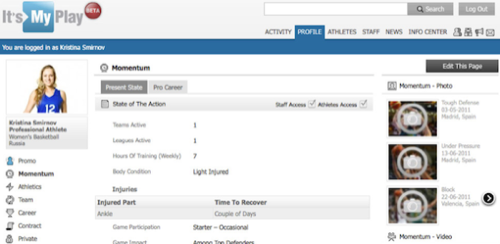
The latest crop of social networking startups strutting their stuff at the DEMO Spring 2012 conference today don’t dare confront Facebook head on. Instead, companies like Ticlr.com, Tradesparq.com, and Max My Play are looking to fill – or create – niches to complement the 800-million-member gorilla in the room.

Aside from sports, creative twists on old-fashioned buying and selling seemed to hold the most promise to the starry-eyed startups. Ticlr.com, for example, showed how it hoped to leverage Facebook to build community around commerce, while Tradesparq.com tapped into professional social network LinkedIn to help companies find suppliers in China.

Ticlr.com is an example of how Facebook is evolving into a network of networks, a trend that could someday remove any sense of a website having a beginning and end. The Winchester, Mass.-based company depends on getting permission to use members’ Facebook contacts in order to make it easy for them to send gifts purchased on Ticlr.com. The gifts can be big to celebrate birthdays and anniversaries or small to break the ice when trying to get a first date. The gift site would compete with other gifting sites such as Wrapp, KangoGift and Giftly.
Tradesparq.com reflects a social networking trend in which sites leverage who a person knows as a way to add credibility to potential business deals. Without LinkedIn, Tradesparq.com would be just another business-to-business site. With the professional network, the company can use a buyer’s LinkedIn contacts to put him in touch with people who know the Chinese supplier bidding on a product request.
Bill Nguyen, founder and chief executive of social app maker Color Labs, told DEMO attendees that Tradesparq.com fits into an emerging category of sites called vendor relationship management. “That’s the ability of buyers to manage their connections and relationships with vendors, so it’s a turning around of the CRM [customer relationship management] concept.”
Sports is a Business, Too
Max My Play, based in Costa Mesa, Calif., is another example of a vertical social network trying to fill a need that Facebook doesn’t touch. This time it’s sports recruiting. Scheduled to launch out of beta in the summer, the company’s site, ItsMyPlay.com, is designed to help amateur athletes promote themselves to coaches and scouts. Athletes can post video, stats, resume and other information, as well as communicate with interested coaches and teams.

These three sites have done a good job of identifying niches. But like other niche-oriented social networks, they’re likely to face problems holding on to their users. Niche players often manage to initially attract a devoted audience, only to lose them later to a larger competitor that moves into the market. That’s because the community usually moves to where there are more people. And Facebook has 800 million people.
















